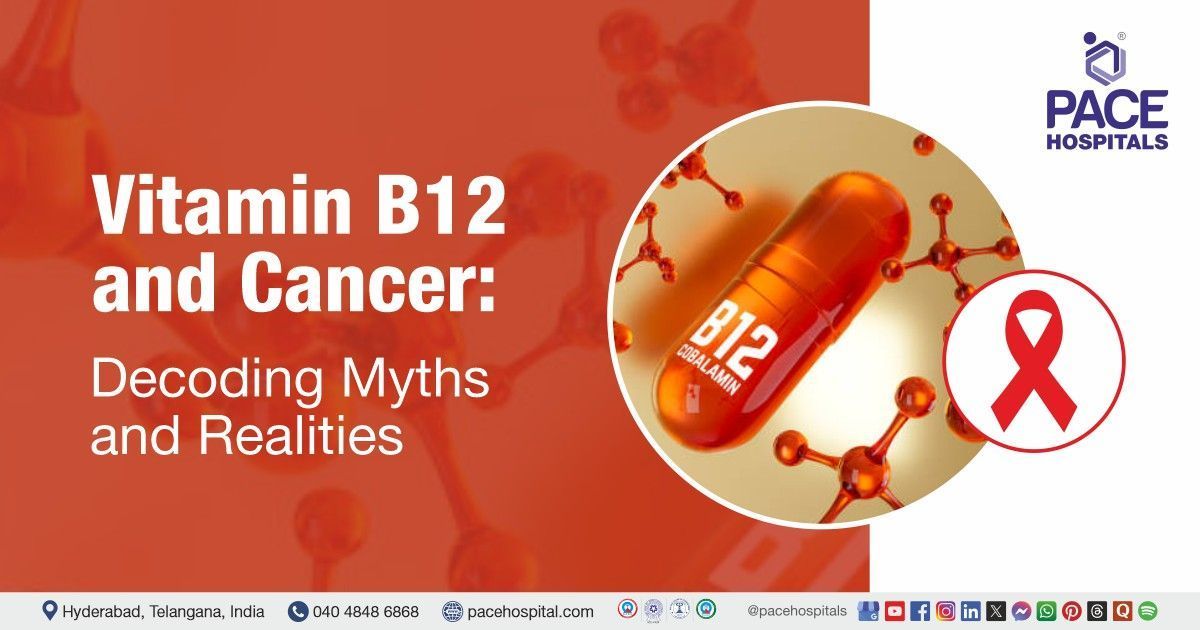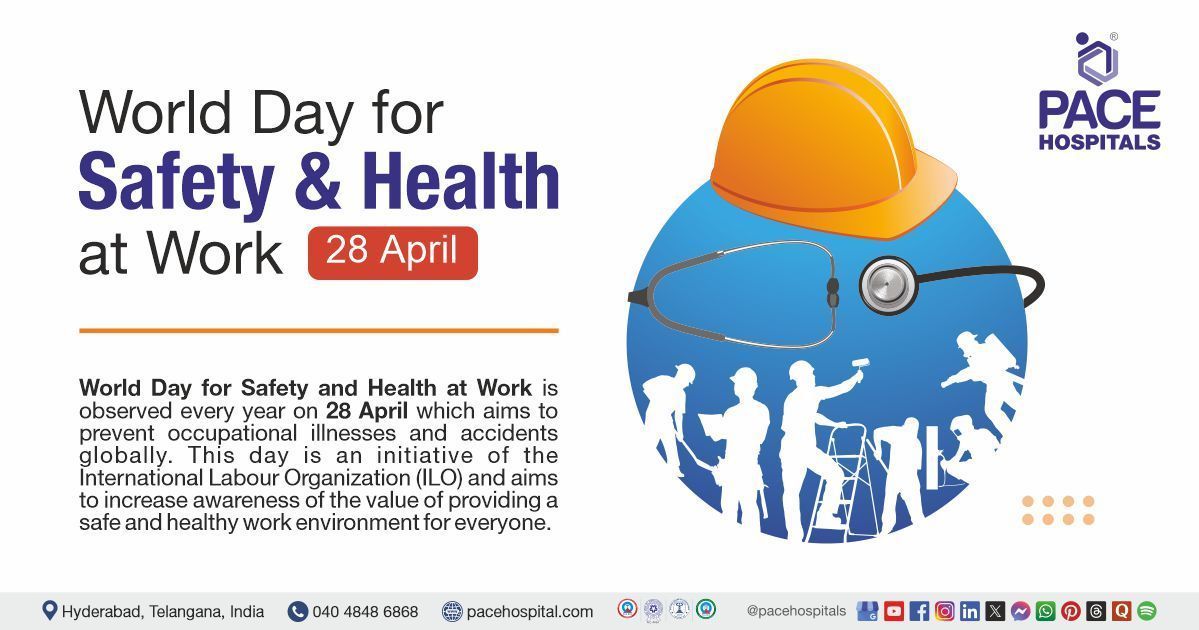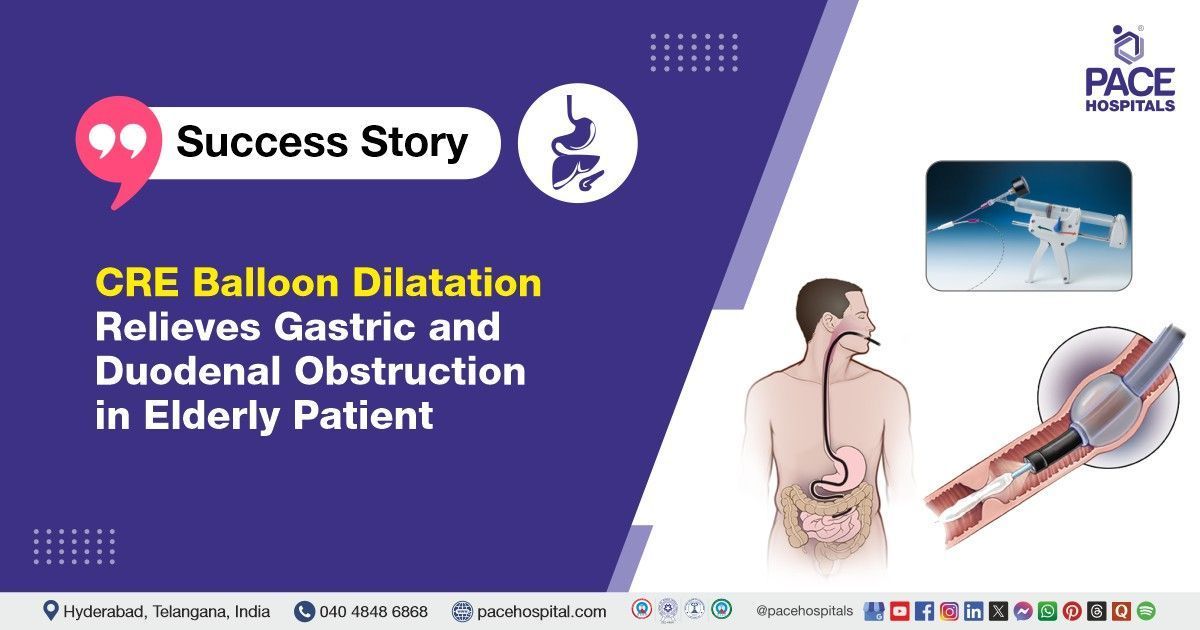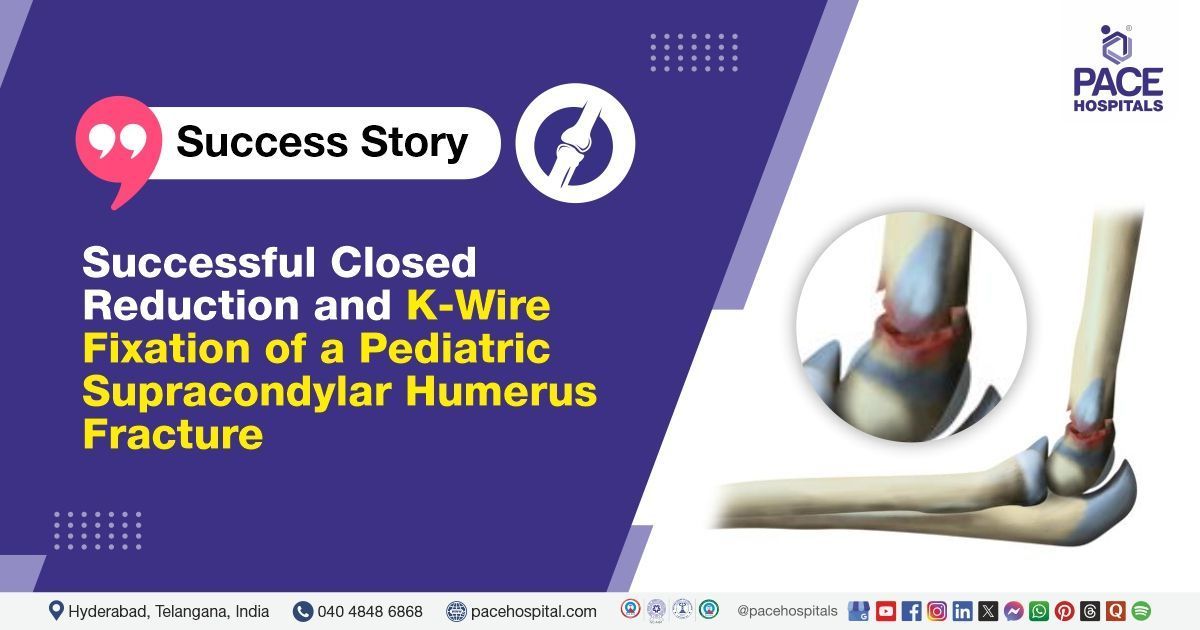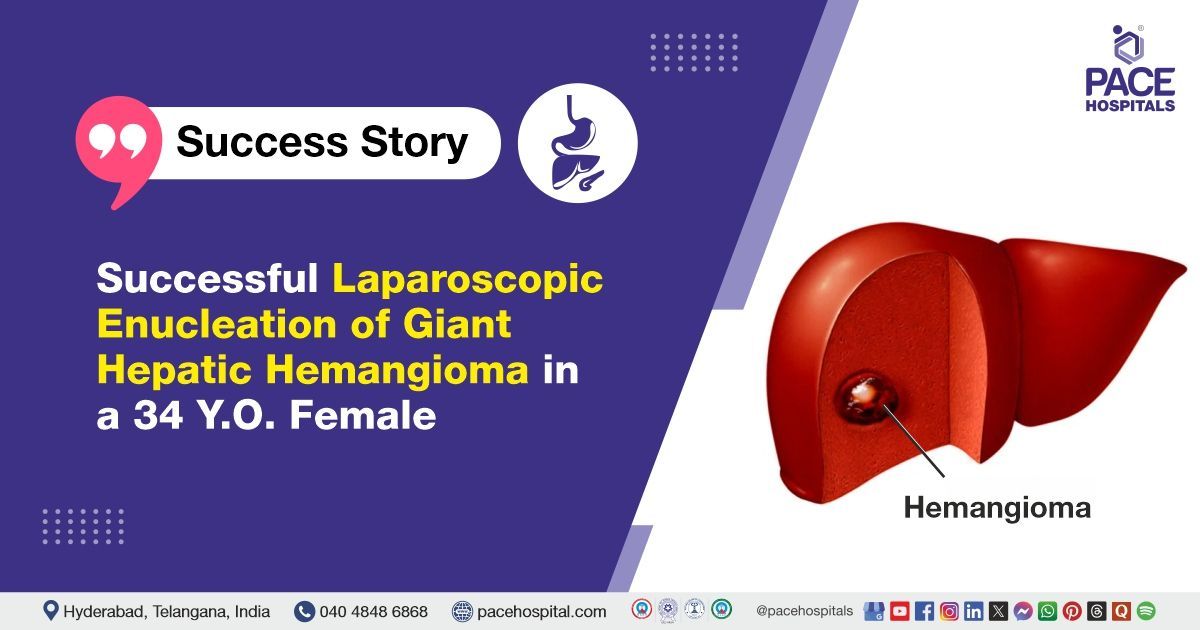Vitamin B12 and Cancer: Decoding Myths and Realities
Introduction
An essential water-soluble vitamin, vitamin B12, also known as cobalamin, plays a major role in many fundamental biological processes to preserve health. Essential for tissue development and regeneration, one of its main functions is supporting the replication and repair of genetic material in rapidly proliferating cells, hence facilitating DNA synthesis.
Moreover, red blood cells are produced with the help of vitamin B12. Deficiency of this vitamin can lead to megaloblastic anemia, a condition marked by the synthesis of oversized and faulty red blood cells that might induce health complications. Apart from its hematologic purposes, B12 greatly promotes neurological health by maintaining the integrity of the myelin coating around nerves, thus promoting nerve cell communication.
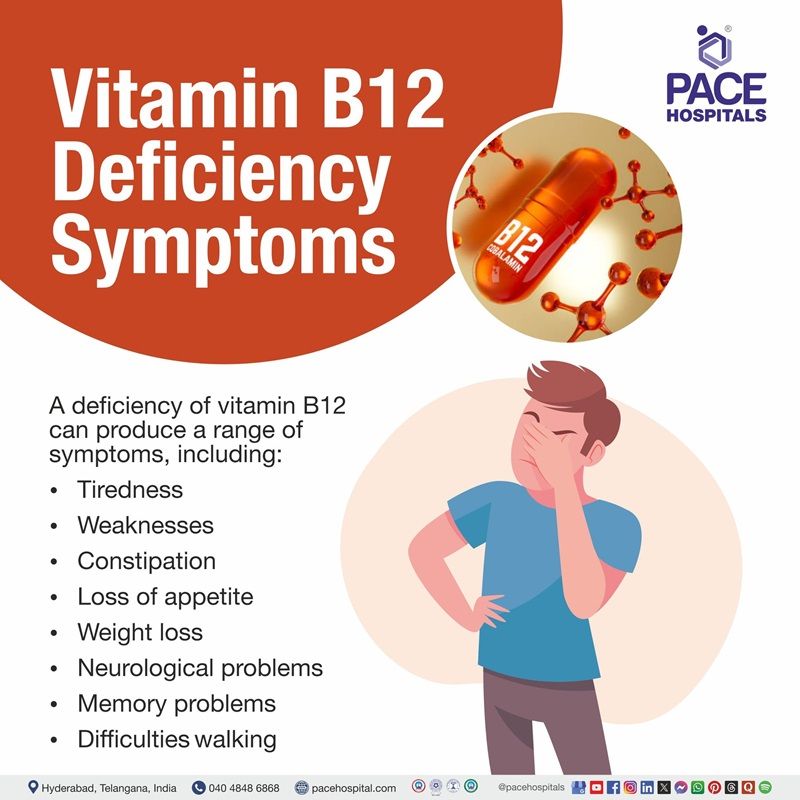
Vitamin B12 Deficiency Symptoms
A deficiency of vitamin B12 can produce a range of symptoms, including:
- Tiredness: Reduced red blood cell production impairs oxygen transport, leading to fatigue.
- Weakness: Inadequate B12 disrupts energy metabolism in muscles, causing physical weakness.
- Constipation: Impaired nerve signaling in the digestive tract slows bowel movements.
- Loss of appetite: B12 deficiency affects gastrointestinal function, reducing hunger signals.
- Weight loss: Decreased appetite and metabolic changes lead to unintended weight reduction.
- Neurological problems, including numbness and tingling in the hands and feet: Damaged myelin sheaths disrupt nerve signal transmission, causing sensory issues.
- Memory problems: Insufficient B12 impairs brain function, affecting cognitive processes.
- Difficulties walking: Neurological damage from B12 deficiency affects coordination and balance.
High vitamin B12 Levels and Cancer: A Marker, not a Cause?
Recent research has brought attention to the observation that elevated plasma levels of vitamin B12 may be linked with the presence of certain types of cancer. However, this association should be approached with caution, as it highlights a correlation rather than a causal relationship.
In a study involving 785 patients, it was found that individuals with vitamin B12 levels equal to or exceeding 1000 ng/L were more likely to have solid tumors, particularly those with metastases. The strength of this association was significant, with an odds ratio of 4.21 for patients with metastatic cancer, suggesting that high B12 levels may act as a biological marker signaling the presence of malignancy rather than being a contributing factor to its development.
The underlying mechanisms are still being explored, but one prevailing theory is that certain cancer cells overexpress haptocorrin, a binding protein that carries vitamin B12 in the bloodstream. This overproduction may artificially elevate circulating levels of vitamins without reflecting an increase in dietary intake or supplementation.
Thus, elevated B12 levels in these cases are not necessarily indicative of excess intake, but rather of altered vitamin metabolism and transport linked to tumor activity. Importantly, these findings do not suggest that consuming high levels of B12 causes cancer. Instead, elevated B12 should prompt healthcare experts to consider underlying conditions, including malignancies, as part of a broader diagnostic assessment.
Low Vitamin B12 Levels and Cancer: A Potential Link
While enhanced B12 levels have received attention as a potential biomarker for cancer, new research suggests a link between vitamin B12 deficiency and increased cancer risk. Lower pre-diagnostic vitamin B12 levels have been related to an increased risk of some malignancies.
One study demonstrated that people with low B12 levels were roughly six times more likely to develop non-cardia stomach cancer. This high link could be attributed to B12's role in DNA synthesis and repair, which is vital in preventing cellular mutations that can lead to cancer.
A deficiency in B12 could therefore result in genomic instability, making cells more susceptible to carcinogenic transformation. Moreover, some meta-analyses have identified links between low serum B12 levels and an elevated risk of both colorectal and prostate cancers.
These associations reinforce the idea that B12 deficiency is not merely a nutritional concern but a potential factor in cancer etiology. Ensuring adequate B12 levels through appropriate dietary intake or supplementation may thus serve not only to prevent classic deficiency syndromes, but also to reduce the long-term risk of certain malignancies.
Vitamin B12 Intake and Cancer Risk
The complex link between vitamin B12 intake and cancer risk is yet under constant research. Mixed results have come from epidemiological studies; some hint to a possible link between high vitamin B12 intake and higher cancer risk while others find no discernible correlation. For example, a study found that men especially had a higher risk of lung cancer linked to increased vitamin B12 intake in diet. Likewise, results from the Vitamins and Lifestyle (VITAL) cohort study showed that those who took large doses of vitamin B12 supplements, especially men, had a higher risk of lung cancer, particularly if they were current smokers.
These results imply that, although the exact processes are unknown, in some situations too many supplements may increase cancer risk. Conversely, meta-analyses looking at how B vitamin supplementation affects cancer incidence, and randomized controlled trials have mostly shown neutral results.
One such study with more than 74,000 subjects revealed that B vitamin supplements, including B12, had either very little or no effect on cancer incidence or fatality rates. Moreover, additional research looking at different cancers including pancreatic, breast, esophageal, and gastric have not regularly shown a substantial or direct correlation with vitamin B12 use. These conflicting results highlight the necessity of careful interpretation and the need of more study, especially to grasp the influence of lifestyle, genes, and baseline B12 level in lowering cancer risk.
Conditions Where Vitamin B12 Deficiency Could Signal Cancer Risk
Although vitamin B12 deficiency is most often due to nutritional gaps or absorption issues, there are rare instances where it may hint at a more serious underlying condition, including cancer. Certain malignancies, especially those affecting the gastrointestinal tract or blood, can either cause or coexist with a vitamin B12 deficiency. Recognizing these associations can help primary care physicians identify when further evaluation is needed.

Gastric Cancer (Linked to Pernicious Anemia)
Pernicious anemia is an autoimmune disorder in which the body’s immune system mistakenly attacks the stomach’s parietal cells, leading to a reduction in intrinsic factor — a protein critical for vitamin B12 absorption. Over time, this process results in chronic atrophic gastritis, which increases the risk of developing gastric cancer and gastric carcinoid tumors.
Patients diagnosed with long-standing pernicious anemia should be monitored carefully for any signs of gastric malignancy, particularly if they experience new gastrointestinal symptoms, treatment-resistant anemia, or unexplained weight loss. In such cases, regular endoscopic evaluations are often advised to detect early gastric changes or precancerous lesions.
Blood Cancers (Leukemia and Lymphoma)
In some cases, vitamin B12 deficiency can occur alongside blood cancers such as leukemia or lymphoma. These conditions disrupt the bone marrow’s ability to produce healthy blood cells, leading to megaloblastic anemia that may mimic symptoms of B12 deficiency.
Moreover, cancer-related inflammation or marrow infiltration can interfere with nutrient metabolism, including the absorption of vitamin B12. If a patient with B12 deficiency presents with persistent anemia, elevated lactate dehydrogenase (LDH) levels, unusual white blood cell counts, or noticeable lymph node enlargement, it is important to consider the possibility of an underlying hematologic malignancy. Referral to a hematologist or oncologist is usually necessary for further evaluation.
Small Intestine and Gastrointestinal Cancers
Cancers involving the small intestine, pancreas, colon or other parts of the gastrointestinal tract can impair vitamin B12 absorption. Tumors may block the ileum — the section of the small intestine responsible for absorbing B12 — or cause mucosal damage that hinders nutrient uptake.
In addition, gastrointestinal cancers can indirectly trigger chronic malabsorption syndromes, leading to or worsening B12 deficiency. Symptoms such as chronic diarrhea, persistent abdominal pain, unexplained anemia, or weight loss in a patient with vitamin B12 deficiency should raise suspicion for possible gastrointestinal malignancies and prompt further investigations.
When Should a Patient with Vitamin B12 Deficiency Be Referred to an Oncologist?
Although vitamin B12 deficiency is often linked to nutritional factors or digestive issues, it can sometimes be a sign of a more serious underlying problem, including cancer. Recognizing the warning signs and referring appropriately can lead to earlier diagnosis and better treatment outcomes.
Red Flag Symptoms That Need Urgent Evaluation
While many cases of vitamin B12 deficiency are harmless, patients presenting with the following symptoms should undergo prompt and comprehensive evaluation:
- Unexplained weight loss
- Persistent or worsening fatigue
- Severe anemia unresponsive to B12 therapy
- Neurological symptoms such as numbness, tingling, or balance difficulties
- Gastrointestinal complaints like chronic indigestion, abdominal pain, visible blood in stools, or trouble swallowing
- Enlarged lymph nodes or recurring infections
The presence of these red flags may suggest an underlying malignancy affecting the blood, stomach, small intestine, or other gastrointestinal structures. In such scenarios, escalating the level of care is crucial to ensure that serious conditions, including cancer, are not overlooked.
Role of Primary Physicians, Hematologists, and Oncologists
The initial evaluation of vitamin B12 deficiency typically falls to the primary care physician / general physician, who conducts a clinical assessment and orders basic blood tests. If the results reveal severe anemia, abnormal blood cell features, or if the patient displays suspicious symptoms, a referral to a hematologist is usually the next step for specialized evaluation.
When cancer is suspected — especially
gastric cancer, small bowel tumors, or blood cancers like leukemia and lymphoma — a prompt referral to
an oncologist (a cancer specialist) becomes critical. The oncologist will oversee advanced diagnostic investigations, including
endoscopy,
CT scans,
MRI imaging, or bone marrow biopsy as needed. Early referral ensures that patients receive timely interventions, improving the likelihood of a successful recovery.
Conclusion, from a Balanced Viewpoint
The interaction between vitamin B12 and cancer is complicated and yet little known. While not definitely linked to cancer, elevated B12 levels have been linked to a higher risk of underlying malignancies and may be a helpful diagnostic sign in some therapeutic contexts. Concurrently with this, a lack of B12 is not innocuous; it has been related to a higher risk of numerous malignancies and might affect immune system and DNA repair processes. Therefore, general health depends on maintaining ideal B12 levels; hence, this balance should be reached by careful use of supplements, a sufficient diet, and individualized medical examination.
With an eye towards the larger clinical picture, one obvious lesson is the importance of vigilance in both spotting and interpreting aberrant B12 levels even as the study develops.
Patients should be urged to talk about their vitamin status and any worries about cancer risk with their healthcare team, since healthcare professionals are very important in guaranteeing that patients receive informed advice based on the latest scientific information.
Frequently Asked Questions (FAQs)
Can high Vitamin B12 levels increase cancer risk?
High vitamin B12 levels have been observed in some cancer patients, but current evidence does not support a direct causal relationship between elevated plasma B12 concentrations or B12 intake and increased cancer risk.
Most studies indicate that elevated B12 is more likely a consequence of cancer or other underlying diseases rather than a cause. Liver cancer shows some association with high B12, but causality remains unproven due to confounding factors.
Which cancers are linked to B12 deficiency?
Vitamin B12 deficiency is most commonly linked to gastrointestinal cancers such as gastric, pancreatic, colon, and esophageal cancers, which impair B12 absorption. Blood cancers can also affect B12 metabolism by disrupting bone marrow function. Some studies suggest links to breast and cervical cancers, but evidence is weaker. These cancers can cause or worsen B12 deficiency due to malabsorption or altered metabolism.
Should cancer patients take B12 supplements?
Cancer patients can take vitamin B12 supplements only if blood tests confirm deficiency. While deficiency can occur due to cancer treatments or malabsorption, excessive B12 may correlate with poorer outcomes in certain cancers. No study prove B12 causes harm, but unnecessary supplementation is discouraged. Testing levels before supplementing is important, with injections preferred for severe malabsorption cases. The approach should be individualized based on clinical need and monitored appropriately.
Can Vitamin B12 cure cancer?
Various B vitamins, such as B1, B2, B3, B5, B6, B9, and B12, have been studied for their possible involvement in cancer prevention, treatment, and side effect management. However, research findings are sometimes conflicting, with some studies claiming benefits and others reporting either no effect or possible hazards, depending on the individual B vitamin, cancer type, and clinical situation.
What is the relationship between vitamin b12 and breast cancer?
Research suggests a complex relationship between vitamin B12 levels and breast cancer risk. Some studies indicate that elevated plasma vitamin B12 levels may be associated with an increased likelihood of developing breast cancer, particularly invasive or hormone receptor-positive subtypes. However, other analyses found no significant overall link, highlighting the need for further investigation. Notably, folate (another B-vitamin) has also shown a potential positive association with breast cancer risk in certain contexts.
What is the relationship between prostate cancer and vitamin B12 deficiency?
While severe vitamin B12 deficiency has been linked to accelerated prostate cancer progression in isolated case reports, larger studies paradoxically suggest that higher circulating B12 levels-not deficiency-correlate with increased prostate cancer risk. This contradiction may stem from reverse causality, where elevated B12 levels could reflect metabolic changes tied to cancer biology rather than directly influencing disease development.
What is the relationship between vitamin B12 and lung cancer?
Some studies indicate a relationship between higher vitamin B12 intake, notably through supplements, and an increased risk of lung cancer, particularly in men. However, the relationship is complex and not universally recognized. While some studies suggest an increased risk for men who consume large amounts of B12, particularly those who smoke, other studies have found no significant link, particularly for women.
Can vitamin b12 deficiency be a sign of cancer?
Vitamin B12 deficiency is not considered a direct biomarker of cancer. However, elevated B12 levels have been more consistently linked to increased cancer risk across multiple studies. While rare cases show severe deficiency coexisting with cancers like prostate cancer, this likely reflects individual metabolic interactions rather than a causal or diagnostic relationship. Clinically unexplained B12 abnormalities warrant further investigation but are not definitive cancer indicators.
Can vitamin b12 prevent cancer?
Current evidence does not support vitamin B12 as a reliable means to prevent cancer. While adequate B12 is essential for normal cell function, studies show mixed or no clear protective effects of B12 supplementation on cancer risk. Elevated B12 levels in cancer patients likely reflect disease processes rather than prevention. Thus, vitamin B12 alone cannot be considered an effective cancer preventive agent.
Does vitamin b12 deficiency cause cancer?
No. current research-based evidence does not support that vitamin B12 deficiency directly causes cancer. Systematic reviews and scoping analyses show no consistent or causal link between low vitamin B12 levels and cancer development. Instead, B12 deficiency is often observed in cancer patients as a result of the disease or its effects on absorption, particularly in gastrointestinal cancers. There is no evidence for temporality, coherence, or a dose-response relationship indicating that B12 deficiency leads to cancer.
Share on
Request an appointment
Fill in the appointment form or call us instantly to book a confirmed appointment with our super specialist at 04048486868

